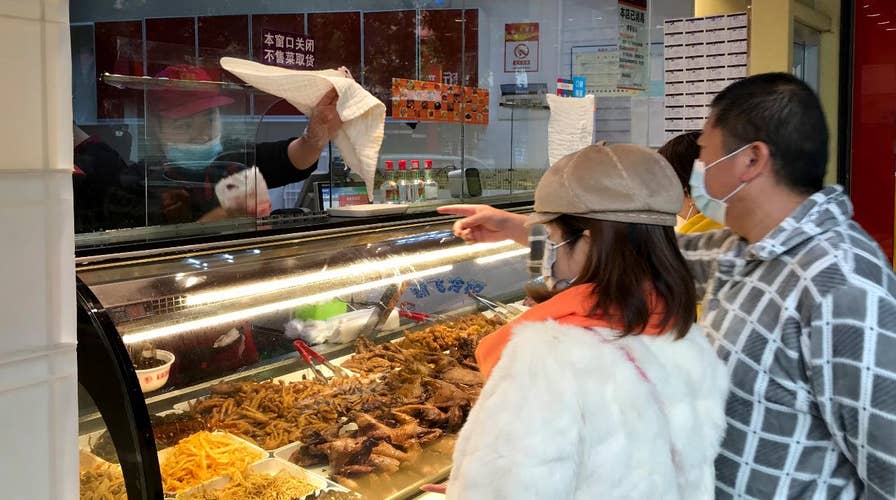China's wet markets are pandemic incubators: Sen. Lindsey Graham
Sen. Lindsey Graham, R-S.C., on holding China accountable for the coronavirus.
Get all the latest news on coronavirus and more delivered daily to your inbox. Sign up here.
The World Health Organization on Thursday pushed back on calls from around the globe to ban wildlife markets, also known as “wet markets,” saying instead that they need to be “well regulated and managed” amid information suggesting that the markets were the source of several coronavirus outbreaks.
Whether they were the source for the current coronavirus pandemic remains a subject of investigation, and there are differing theories.
But wet markets nevertheless have faced worldwide scrutiny. A spokesman for the WHO said Thursday that the organization “shares the concern about diseases, such as coronaviruses, that can pass between animals and humans, and strongly supports the implementation of measures to minimize any potential risk of transmission.”
“WHO also recognizes that food markets are key for people’s food security — they are the main source of affordable vegetables and fruit, seafood, poultry and meat for many in Asia,” the spokesman said. “WHO maintains that governments should rigorously enforce bans on the illegal trade and sale of wildlife for food, and for appropriate resources and attention to be given to ensuring food markets are clean, hygienic and safe before consideration can be given to resuming activities.”
The spokesman added that “these markets need to be well regulated and managed.”
The organization argued that the issue of so-called “wet markets” goes beyond the health sector and requires “joint work with many sectors including agriculture and animal health.”
“WHO works closely with partners such as the U.N. Food and Agriculture Organization (FAO) and the World Organization for Animal Health (OIE) — partners who advise governments on the regulation of markets and animal husbandry — and we have together established guidelines for healthy food markets," the spokesman added. “With these partners, we are ready to provide advice and support to countries considering the re-opening of markets so that these can operate under safe conditions.”
The WHO statement comes after top lawmakers penned letters to the organization urging them to require a global shutdown of these kinds of markets, saying that they “are believed to be the source of the current COVID-19.” They also noted that scientists estimate that approximately 60-75 percent of emerging infectious diseases are zoonotic and that approximately 72 percent originate from wildlife
On Wednesday, Rep. Steve Chabot, R-Ohio, even introduced a resolution urging all nations around the globe to permanently shut down the markets.
“An unsanitary live wildlife market in Wuhan, China, launched the coronavirus pandemic,” Chabot said in a statement.
These types of markets had been thought to be the source of the novel coronavirus, but that narrative has been called into question as Fox News reported this week that government sources increasingly believe that the virus, instead, likely escaped from a lab in Wuhan, China.
Sources who have been briefed on the details of early actions by China’s government and seen relevant materials told Fox News that there is increasing confidence among officials that the outbreak likely originated in a lab, though not as a bioweapon, but as part of China’s attempt to demonstrate that its efforts to identify and combat viruses are equal to or greater than the capabilities of the United States.
The sources believe the initial transmission of the virus – a naturally occurring strain that was being studied there – was bat-to-human and that "patient zero" worked at the laboratory, then went into the population in Wuhan.
The “increasing confidence” comes from classified and open-source documents and evidence, the sources said. Fox News has requested to see the evidence directly. Sources emphasized – as is often the case with intelligence – that it’s not definitive and should not be characterized as such. Some inside the administration and the intelligence and epidemiological communities are more skeptical, and the investigation is continuing.
Earlier this month, the WHO issued guidance for food businesses on COVID-19 and food safety, and said that they are continuing to work with food safety experts around the world to update guidance on the markets.
Meanwhile, the statement comes as the WHO and the United States are locked in a funding battle, as President Trump announced this week that he would freeze U.S. dollars to the organization.
The president said the organization put “political correctness over lifesaving measures,” noting that the U.S. would undertake a 60- to 90-day investigation into why the “China-centric” WHO had caused “so much death” by “severely mismanaging and covering up” the coronavirus spread.
Dr. Anthony Fauci, the top infectious disease expert in the U.S. and a key member of Trump's coronavirus task force, has said misinformation from China, repeated by the WHO, had affected U.S. response efforts.
The United States is the WHO's largest single donor, and the State Department had previously planned to provide the agency $893 million in the current two-year funding period. Trump said the United States contributes roughly $400 million to $500 million per year to WHO, while China offers only about $40 million. The money saved will go to areas that "most need it," Trump asserted.
NEW YORK, CALIFORNIA LAWMAKERS CALL FOR STATE BAN ON 'WET MARKETS'
WHO Director-General Tedros Adhanom Ghebreyesus, who has faced calls to resign from his post amid the controversy, issued a statement slamming the president’s move.
"We regret the decision by [the] president of U.S. to order [a] hold on funding to WHO ... we will work with our partners to fill any financial gaps we face and make sure work continues uninterrupted.”
He added: “But for now our focus is on stopping this virus.”
As of Thursday, the number of positive cases of COVID-19 around the globe had surpassed 2 million, and nearly 140,000 deaths.
The U.S. reported more than 640,000 positive cases on Thursday and more than 31,000 deaths due to the coronavirus.




